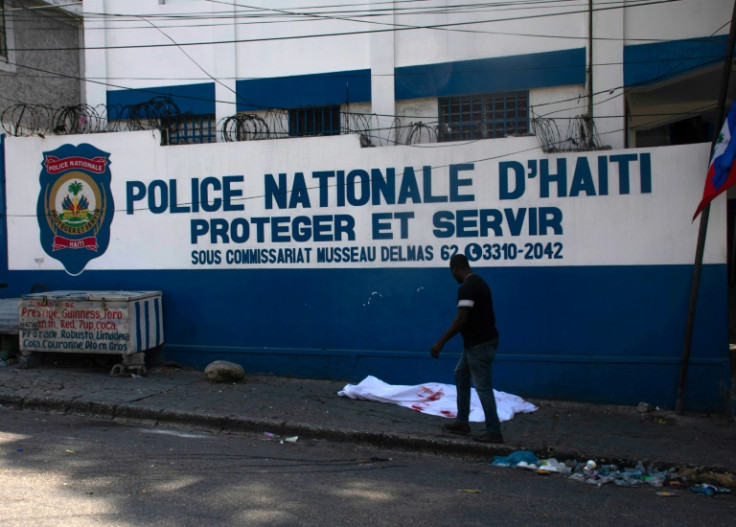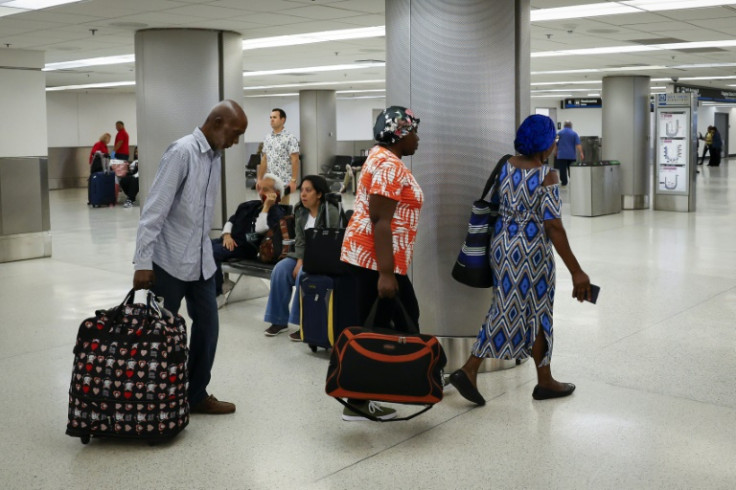Gangs Make Advances As Conditions In Haiti Worsen

Haiti's gangs have made advances in Port-au-Prince, a UN official reported Thursday, with conditions in the capital worsening as talks drag on to form a transition government in the troubled Caribbean nation.
Addressing a news conference from Haiti via videolink, Ulrika Richardson, the UN humanitarian coordinator for the country, said daily life had become defined by roadblocks and the sound of gunshots, describing "enormous" amounts of people displaced as gangs "take over" neighborhoods in the city.
The country has been rocked by violence since late February, when the country's gangs launched a coordinated offensive, raiding a prison and releasing thousands of inmates as they demanded Prime Minister Ariel Henry resign.
Henry, stranded in Puerto Rico after the violence shut down the main airport, has since agreed to step down and allow the formation of an interim government. But negotiations have been slow despite pressure from neighboring Caribbean countries and the United States.
Meanwhile police are struggling as armed groups in recent days "advanced into new areas of the capital," Richardson told reporters.
"We see people coming in with gunshot wounds from many areas around Port-au-Prince."
Richardson's comments came as gunshots were again ringing out in Port-au-Prince on Thursday afternoon, residents told AFP.
The day prior, in the town of Lascahobas, some 50 miles (80 kilometers) from the capital, Haitian police said an alleged gang member was taken from their custody by an angry mob and lynched.
The UN Security Council called on countries to enforce an existing arms embargo on Haiti, amid "grave concern at the illicit flow of arms and ammunition into Haiti that remains a fundamental factor of instability and violence."
"The members of the Security Council reiterated their full support for a Haitian-led, Haitian-owned political process," the Security Council statement said, urging the eventual organization of "free and fair legislative and presidential elections."
President Jovenel Moise, who appointed Henry, was assassinated in 2021 and never replaced. Henry has led the country since, with no elections held since 2016.
The transitional council currently being organized would name an interim prime minister to oversee a national vote.
But the council faces a tall task ahead of it, with 80 percent of the capital and swaths of the countryside under gang control, and many ordinary Haitians already skeptical of the body.
Still, Secretary-General Antonio Guterres welcomed "reports that Haitian stakeholders have all nominated representatives to the transitional Presidential Council," a spokesman said.
"He calls for all efforts to maintain the momentum and cohesively work towards the implementation of the transitional governance arrangements agreed upon."
Meanwhile, the head of the World Health Organization said the closure of Port-au-Prince's airport has made it impossible to import essential goods and medicine.
"The national port is operational, but accessing it is challenging, as the surrounding areas are controlled by gangs," Tedros Ghebreyesus said.
And an ongoing cholera outbreak, "which has been declining since the end of last year, could flare up again should the crisis continue," he warned.
The United States said that it evacuated 90 more citizens from Haiti on Thursday with a government-organized airplane from the northern city of Cap-Haitien to Miami and helicopter flights from Port-au-Prince to the neighboring Dominican Republic.
"We reiterate our message to US citizens: Do not travel to Haiti," a spokesman said.

© Copyright AFP 2024. All rights reserved.











